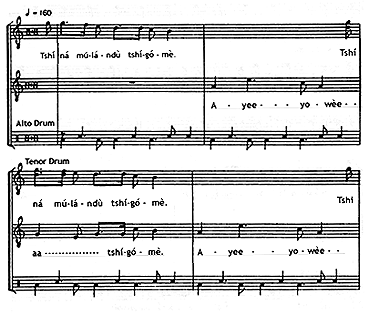| |
| 1 |
Tshi na mulandu tshigome. |
| |
The locust has done wrong. |
| 2 |
A tshi vhulahwe tshigome. |
| |
Let the locust be summoned for trial. |
| Chorus: |
Ahee, yowee, tshigome. |
| |
Alas, poor locust. |
| After the song has been repeated a few times, the performers declaim words as in Song No. 25. |
Xaxae! Tsho limutshela zwone zwigome zwa Vho- . . |
| Haha! There has been trouble from those locusts of Mr Nelamvi. |
Zwo rwa   zwi tshi ya tsimuni ya Vho-Nyamuofhe. zwi tshi ya tsimuni ya Vho-Nyamuofhe. |
| They stood in a row when they went to Mrs Nyamuofhe's garden. |
Zwo no fhedzisa  vhuubauba, vhannaniwee! vhuubauba, vhannaniwee! |
| They finished up those young sprouting maize plants, alas! |
Kana zwi ri, Tshimbiluni u   ' ni? ' ni? |
| Now they say, "What is Tshimbiluni going to eat?" |

The girls stand with their hands behind their backs for the recitation. They repeat the song after the recitation, and then alternate between song and recitation. During the song, they shuffle their feet backwards and forwards, leaning each time on the forward foot.
This teaches a girl that she must be careful when she marries and goes to her husband's home. She must not take any maize from the granary of another woman in the household, or she will be accused of being a thief. This lesson does not conflict with the encouragement of stealing under special circumstances, as when the novice is woken up at night and told to take food from her mother's granary. The two lessons are complementary in emphasizing the principles of patrilineal authority and lineage solidarity: a girl may take from her mother, but not from any of the women in her husband's home, precisely because she is a privileged member of her father's lineage but, like her mother, a stranger and subordinate in the home of her husband. |
|
|